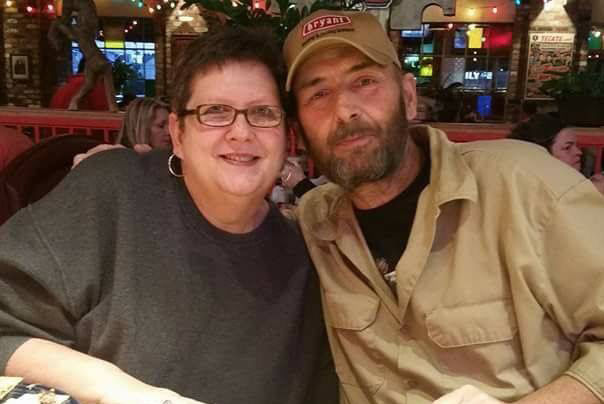Breast cancer survivor says attitude is everything
Published 1:00 pm Sunday, October 14, 2018

- Courtesy photoDanny Wales, right, continues to fight colorectal cancer after supporting his wife, Sharon Wales, left, through her battle with breast cancer. Sharon discovered a lump in her breast three years ago while taking a shower. She is now cancer free after undergoing a double mastectomy and more than six months of chemotherapy treatments.
Cancer has hung like an ominous dark cloud over Sharon Wales most of her life. She lost her father to the disease when she was only 6, her mother to it when she was 26, and four of her seven siblings over the years. If that was not enough, colorectal cancer struck her husband, Danny, 10 years ago, leaving him disabled.
Despite her many brushes with cancer, Wales, 54, wasn’t prepared to find a lump in her breast while taking a shower three years ago. Not one to do regular self-examinations, Wales noticed the lump and thought it seemed to come out of nowhere. She immediately made an appointment at the Breast Care Center in Huntsville.
A diagnostic mammogram confirmed the lump was suspicious, so doctors performed a biopsy the same day.
“The radiologist told me if they see it like it was it was more than likely cancer,” Wales said.
The following Monday, she received confirmation that she had Stage 2 breast cancer.
“When I heard them use the word cancer it was devastating,” said Wales, a pharmacy technician at Jones Drugs in Ardmore. “All my life I was paranoid about getting cancer because of my parents and siblings. I was in shock when I heard I had it, too.”
Doctors at the Breast Care Center gave her a choice — a partial or full mastectomy.
Given her family history, Wales told the doctors to remove both of her breasts.
“I didn’t want it to come back. I didn’t want to go through the pain of another surgery or risk it spreading,” she said. “It just made sense to have them both removed.”
Following the surgery, which also involved the removal of several lymph nodes, Wales faced a long and difficult recovery. She couldn’t raise her arms for weeks, making everyday activities such as washing her hair or getting dressed nearly impossible. Also, the drain tubes she had to wear home from the hospital limited her mobility and caused her pain.
“I would say it was a good month before I could get around,” she said, noting her husband took care of her despite having cancer himself.
The mastectomy, however, was just the beginning of a long, drawn out fight that would include more than six months of grueling chemotherapy. The treatment consisted of a biweekly cocktail of chemicals so aggressive one of them was called red devil. It made her hair, eyebrows, eyelashes, fingernails and toenails fall out. It burned her palms so badly the outer layer of her skin fell off. The treatments also left Wales with a constant taste of metal in her mouth, preventing her from eating or drinking. Over the course of treatment, she lost 65 pounds and would often become so dehydrated she required intravenous fluids.
“Somehow, I worked through it all,” Wales said. The people at Jones Drugs were supportive and good enough to let her leave early when necessary.
Once the chemo was finally over and Wales’ doctors were confident they had gotten all the cancer, she started the arduous process of having her breasts reconstructed.
He hair and eyelashes have since grown back, but her eyebrows, never very dark in the first place, are a lost cause, she said. Although relieved she is now cancer free, Wales said her energy level isn’t what it used to be. It’s hard for her to stand for an 8-hour shift anymore.
Thinking back on that day in the shower, Wales urges all women to do regular breast self-examinations because the procedure may well have saved her life.
According to the website www.braincancer.org, breast self-examination “is a useful and important screening tool, especially when used in combination with regular physical exams by a doctor, mammography and ultrasound.” Some breast cancers are found only by physical examination, not by mammography, so the website recommends all women perform breast self-exams as part of their overall breast-cancer screening strategy.
“Get your yearly mammograms,” Wales said. “I hadn’t had one in three years because of financial constraints. If I had, it may have caught the cancer even earlier.”
Some experts recommend women get yearly mammograms starting at age 40. The American Cancer Society recommends yearly screenings for women between ages 45 and 54 and biannual screenings for women 55 and older.
Throughout her ordeal, Wales said treatment was important but attitude was everything.
“If you are down and out and depressed all the time, you aren’t going to heal as fast,” she said. “But if you are laughing and cutting up all the time, that will help with your recovery.”
Pointing to the example her husband set, Wales said, “He is very lighthearted about his cancer. He would tell me it’s going to be okay, that it’s in God’s hands and he’ll take care of you.”
For those in the thick of battle, Wales offers the following hard-won advice: “Be strong and hold your head high.”


